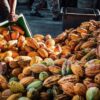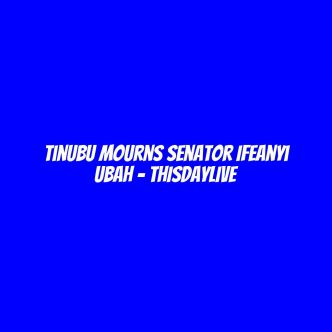
The Cocoa Farmers Association of Nigeria (CFAN) has written an open letter to the European Union (EU) Commission requesting an extension of the European Union Deforestation Regulation (EUDR) implementation.
The European market, which takes up about 70% of cocoa exports from Nigeria as major buyers, has set up regulations prohibiting cocoa harvested from deforested areas or those produced with child labour. Hence, the EUDR was initiated to curb deforestation and forest degradation driven by EU consumption of certain commodities.
The letter, addressed to Janusz Wojciechowski, EU Commissioner for Agriculture, Brussels, Belgium, was also sent to Nigerian President, Bola Ahmed Tinubu, Minister of Agriculture and Food Security, Senator Abubakar Kyari, and the Minister of Industry, Trade, and Investment. It was signed by the National President of the Association, Comrade Adeola Adegoke.
The letter specifically appeals for the deadline for EUDR implementation to be postponed from December 2024 to December 2025. It also points out that Nigeria has achieved about 60% traceability in its supply chain through due diligence efforts by stakeholders.
The letter read: “Cocoa Farmers Association of Nigeria would like to join the Federal Government of Nigeria, through the Federal Ministry of Agriculture and Food Security, and several other voices around the globe, including the United States of America and EU member states, in the need for the European Union to postpone the implementation of EUDR compliance for another year.
“Our appeal is based on the imminent negative impact on the livelihoods of cocoa farmers if the present date is not shifted by one year to enable better preparations by the smallholder cocoa farmers, who have been hampered by a lack of adequate information on EUDR at their farm gate levels.
“Nigeria is one of the cocoa origin countries in the world, contributing about 6.5% to global cocoa production and accounting for 29% of total agricultural export in 2023, valued at N1.24 trillion with an estimated value of N356.16 billion.
“This makes it imperative for the EU Commission to reconsider the need for the postponement of EUDR for one year to enable better preparations.
“Nigeria now has about 279% increment in cocoa exports revenue. And the majority of our cocoa farmers are in penury, aside from the new cocoa soaring prices recently enjoyed by the farmers of Nigeria due to the deregulation of the Nigeria cocoa sector, above our cocoa farmers’ counterparts in Ivory Coast and Ghana that run a regulated cocoa board which buys and sells cocoa unlike what obtains in Nigeria.
“EUDR compliance at this time might be pushing our cocoa farmers into more poverty if the time frame is not re-adjusted.
“You must recall that it was CFAN that first raised the alarm on EUDR in 2021 through a press conference done in collaboration with the Federal Ministry of Agriculture & Food Security at the Ministry’s headquarters in Abuja in October.
“This was at a time the Association was preparing for the scheduled Nigerian Cocoa Summit & Award event that was held on November 30th and 1st December 2021 at Sandrela Hotel, Abuja.
“We are aware of the fact that Nigerian cocoa could be at risk if we do not take necessary legal steps to stop and remediate deforestation and come up with strategies for gaining forest loss in our cocoa communities through our collective action.
“And also comply with other factors listed in Articles 3(b) of the regulations which also deal with land rights, human rights, labour rights, laws of the indigenous people, tax, and corruption now staring us in the face as a cocoa origin country.
“Today, where are the people calling us agents of doom on many national news platforms when we raised the alarm in 2021? Nigerians would testify to CFAN’s outcry to the relevant government institutions and several media outlets about the impending actions of the EU on due diligence, which requires full traceability disclosure of these listed products: wood, cocoa, oil palm, soy, rubber, coffee, and cattle.”
He expressed the appreciation of the association to the good disposition of the Federal Ministry of Agriculture and Food Security, Federal Ministry of Industry, Trade and Investment, representing the Federal Government of Nigeria, and the 9th National Assembly, who acted on a motion presented by one of the House of Representatives members from Lagos State, and directed the FMARD, as it was known then, and FMITI to look into the issues raised by CFAN.
He said it showed that the Nigerian cocoa industry, worth $770 million, will be at risk if urgent steps are not taken to solve some sustainability issues like deforestation and traceability.
“However, we have continued to take some positive steps to make Nigeria’s cocoa sector sustainable as a leading and largest smallholder cocoa farmers organisation, in collaboration with relevant stakeholders and partners in the last five years.
“All these collaborations have yielded positive results for the industry in the three key index areas of sustainable development: social, economic, and environmental, which guarantee a promising future for our cocoa value chain.”
According to him, the association has embarked on advocacy and capacity training for cocoa farmers in the areas of the protection of the ecosystem, based on the production of deforestation-free cocoa and protection of the rights of labourers and children.
“These trainings were done in partnership with other stakeholders across the cocoa-producing communities tagged: Cocoa Farmers Roundtable Conference. The initiative brought together all cocoa operators in each cocoa-producing state, e.g., farmers, local buying agents, buyers, processors, exporters, extensionists, policymakers, inputs providers, researchers, etc.
“The training also dwelt on good cocoa production practices, e.g., safe usage of cocoa inputs, application of approved pesticides in cocoa farms, climate change & mitigation, cocoa agroforestry practices, child labour eradication, and sustainable farm management.
“Due to the critical role finance plays in cocoa production and productivity, the Association had sourced funding for cocoa farm maintenance in 2021 through the Central Bank of Nigeria – Anchor Borrowers Program scheme, in order to sustain and expand cocoa investment productivity.
“It has a single-digit interest rate and was disbursed to 10 cocoa-producing states of Ondo, Ekiti, Oyo, Kwara, Cross River, Abia, Edo, Osun, Ogun, and Delta. One of the requirements of the loan facility was that each of the beneficiaries’ farms must be mapped.
“About 1,227 cocoa farmers benefited from the CBN-ABP loan which amounted to N723 million above at 1% less N600,000 per beneficiary, while the number of hectares covered by the scheme was at three hectares per beneficiary, totaling 3,681 hectares across the 10 beneficiary states.
“This was the first sustainable loan given to cocoa farmers of Nigeria nationally in the last 20 years. The loan, after two years of disbursement and continuous repayment by the beneficiaries, has steadily increased the productivity of the beneficiaries’ farms by 30% and sustainable practices by 70% based on the independent survey report conducted by a reputable consultant.”
He indicated that the survey was facilitated by the CBN to appraise the performance of the loan and its footprint across the beneficiary communities. “Most beneficiaries are alive and can also testify to the huge success of the loan scheme.
“CFAN also organised the first privately driven and publicly enabled Nigerian Cocoa Summit & Award in order to find workable solutions to the issues affecting the cocoa industry. This summit was in partnership with relevant government ministries, agencies, and private sector operators.
“The Summit brainstormed extensively on the EUDR coming into force, living income differential, national cocoa plan, inadequate local cocoa processing, value addition & consumption, and the need for Nigeria to have a cocoa regulatory framework that will drive the industry, rather than the system being on autopilot that has not helped the growth of the sector. The summit communique was released to the public. CFAN’s continuous advocacy led to the Nigerian delegation to Ghana on a fact-finding mission.
“The delegation to Ghana was mandated by the FMAFS to study how the Ghanaian cocoa economy is run and how Nigeria could benefit from their wealth of experience as the second-largest producer of cocoa in the world.
“The report of the five-man delegation to Ghana led to the inauguration of the 11-man National Cocoa Management Committee on the 2nd of August, 2022, by the former Honourable Minister of Agriculture and Rural Development, now Food Security, Mohammad Abubakar.
“The Minister said in his inauguration speech that it was the outcry of the Cocoa Farmers Association of Nigeria, especially concerning living income and other demands such as cocoa regulatory framework, and the need for stakeholders to respond to the EUDR compliance that informed his decision to constitute and inaugurate the committee. The committee will oversee the affairs of the cocoa industry with membership drawn across the cocoa supply chain.
“We are delighted that NCMC has since swung into action by mobilising stakeholders in the sector to solve some sustainability issues, e.g., low production & productivity leading to poor income among cocoa farmers, child labour, deforestation, ecosystems mismanagement, pesticides residue, infrastructural gaps, inadequate traceability system, low value addition, low cocoa processing, lack of access to finance, policy inconsistencies, etc.
“These numerous challenges highlighted above are being handled by several partnership programs initiated by the NCMC since its inauguration with relevant supply chain operators,”he said.
He indicated that issues like the EUDR compliance, Nigeria Cocoa Plan, and funding of the committee topped the major agenda discussed at the parley when the NCMC members paid a courtesy visit to the Minister of Agriculture and Food Security, Senator Abubakar Kyari, with the Minister of State and the Permanent Secretary.
At that parley, he said the Minister gave his full support to the committee while he also restated the commitment of the present administration under President Bola Ahmed Tinubu to the development of the Nigerian cocoa economy.
“Another intervention by CFAN is in the provision of Good Agricultural Practices (GAP) book to cocoa farmers free of charge across the major and minor cocoa producing States in Nigeria. The Association collaborated with her partners in the areas of resourcefulness and funding for the publication of the GAP books, in order to make it free for our cocoa farmers.
“We appreciate the contributions of our partners to this project especially CRIN, EBAFOSA, Harvestfield Industries Ltd, ofi, Ooni of Ife Outreach, Starlinks Global & Ideal Ltd, Gbemtan Ltd, FMAFS, FMITI, but space cannot permit us to mention other company’s name one by one.”
“About 46,000 copies of the GAP book have been freely distributed so far. The Association is gearing up again to extend the distribution of the GAP book to the cocoa farmers in Kurmi Local Government of Taraba State, being one of the cocoa producing States in Northern Nigeria, having boundaries with the Cameroun.
“The most interesting thing about the GAP book is its interpretation in local languages that cut across the demographic spread of our cocoa plantations for wider understanding and accessibility to the cocoa farm gate. The donation of the GAP book free serves as an advocacy mechanism to inform cocoa players, particularly our cocoa farmers on EUDR domestication.
“The book also advised cocoa farmers against deforestation and child labour practices that could undermine the future of our cocoa trade. The book addresses tropical issues like agroforestry, traceability and climate change and its impact on our ecosystems, while it offers practicable solutions for mitigation, resilience and adaptation.
“In order for CFAN to deepen her sustainability programs, especially as it concerned the strengthening of the collaboration among stakeholders, CFAN came up with the National Cocoa Festival event to replace the Nigerian Cocoa Farmers Day earlier celebrated by the Association in the year 2019 and 2021.
“The celebration of the 1st & 2nd National Cocoa Festival events took place in Ondo and Abuja, while the 3rd National Cocoa Festival event will now take place in Calabar, Cross River State on the 23rd and 24th October, 2024. The festival has become platform to address the prevailing issues in the Nigeria cocoa industry.
“The issue of standard harmonisation(SH) which is one of the requirements for due diligence statement (DDS) in each cocoa trading country has been taken care of by the Standard Organization of Nigeria, Cocoa Research Institute of Nigeria and other stakeholders in collaboration with cocoa origin countries in West Africa under African Organization For Standardization (ARSO).
“CFAN believes in traceability through the mapping of her members’ farm plots and has made conscious effort to continue to geo-locate all her members’ cocoa farm plots gradually across the cocoa communities in Nigeria.
“No doubt, the Association is one of the partners to the U.S Department of Agriculture & Lutheran World Relief for Food for Progress Traceability and Resilience in Agriculture and Cocoa Ecosystems (TRACE) project, which is expected to contribute to the development and strengthening of the Nigerian cocoa traceability system.
“The project will also train our cocoa farmers on climate smart practices in order to enhance access to market.
“These six States are the only beneficiaries of the project; Ondo, Ekiti, Osun, Cross River, Akwa Ibom, Abia. And will be financed to the tune of 22 million USD in the next five years.
“Moreover, the use of mapping to determine the traceability of our cocoa plantations location has been carried out by many of our exporters and processors through their sourcing companies operations in most cocoa communities.
“These companies used their sustainability programs to collect the bio-data of their cocoa farmers’ supplier through the mapping of their farmers’ farm plots e.g farmer’s identity, sex, family size, plot size(determining polygons, longitudes & latitudes), location, community etc in order to train them on sustainable practices with empowerment.
“In order to eradicate child labour practices in our cocoa supply chain, the Association deliberately partnered with organizations like International Labour Organization, Nigeria Employers Consultative Association and Lutheran World Relief through various community programs like ACCEL Africa, GALLAB , CLEAR etc. “These projects are specifically for the cocoa producing communities in Nigeria and Ondo State in particular, being the highest cocoa producing State and other high risk States in child labour practices.
“The programs identify the high risk cocoa communities in child labour with necessary advocacy deployed to tackle the issue headlong. Education is used as remediation tool by CLEAR project being sponsored by the Lutheran World Relief, through an intensive sensitization and support to both the parent and the vulnerable children in their communities, with necessary skill acquisitions and other empowerment training that would make them self reliant, while encouraging their children to go to school.”












